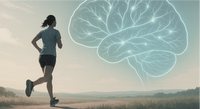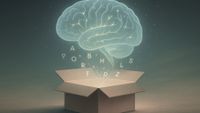Neuroscience for your everyday life, explained simply and practically applicable.
Resilience is not a coincidence: your brain can train it
“Resilience is not an innate talent, but a learned skill—deeply embedded in the neural network of our brain.” - George Bonanno
Resilience - the ability to overcome crises and emerge stronger - has long been considered a character trait. Today we know that it is a trainable neurobiological system.
What happens in the brain:
Our brain's resilience system consists of three key areas:
- Prefrontal cortex: It helps regulate emotions and make clear decisions.
- Amygdala: It responds to threats – resilience means consciously modulating these alarm reactions.
- Hippocampus: It stores experiences and helps to classify stress.
Neuroscientific studies show that regular training of mental strategies – such as mindfulness or reframing – measurably strengthens the connectivity between these areas.
A long-term study by the University of Wisconsin–Madison (Davidson & McEwen, Nature Neuroscience Reviews, 2012) showed that people who meditate regularly or engage in conscious reflection exhibit reduced activity in the amygdala and increased neural density in the prefrontal cortex – they respond more calmly to stress.
The role of neuroplasticity
Resilience is created by neuroplasticity – the brain's ability to restructure itself through experience. Every conscious decision to remain calm instead of reacting, to be confident instead of fearful, creates new neural pathways. Repetition makes them stronger – just like a footpath that becomes a wide road over time.
“Neurons that fire together, wire together.” - Donald Hebb (Hebb's learning rule)
Everyday tip:
Start with small routines:
- 3 minutes of mindfulness in the morning
- 1 conscious breath before each response
- Write down 1 positive experience per day
These seemingly small moments shape your brain – and thus your inner resilience.
More on this in the book ChangeCockpit Resilience
Learning a language strengthens your brain – even in adulthood
“The brain is not a storage device, it is a muscle – and languages are its best training.” - Dr. Thomas Bak
Many people believe that learning languages is only for children. But neuroscience shows the opposite: our brains remain plastic, i.e. capable of learning, into old age – especially when challenged. And hardly anything challenges it as much as a new language.
What happens in the brain:
When you learn a new language, several areas of the brain work simultaneously:
- The prefrontal cortex plans and controls,
- the hippocampus stores new words,
- and the temporal lobe processes sound and meaning.
This coordinated activity strengthens neural networks and increases the density of gray matter, as studies with multilingual subjects show.
A study by University College London found that even a few months of intensive language learning cause detectable structural changes in the brain. (Mårtensson et al., NeuroImage, 2012)
Multilingualism even has a protective effect against cognitive aging processes: A long-term study by Bialystok et al. (Neurology, 2007) found that bilingual people show symptoms of dementia on average four to five years later than monolingual people.
Language as mental fitness:
Language is therefore more than just communication – it is mental strength training: New words activate emotional and cognitive systems, strengthening attention and flexibility. Even searching for the right word is brain training: it connects synapses, similar to how physical strength training strengthens muscles.
“Every new language is like another window through which to see the world.” - Federico Fellini
Everyday tips:
You don't have to cram grammar.
Even small routines can help:
- Learn 5 new words every day in a language that inspires you.
- Listen to music, podcasts, or watch movies with subtitles in the target language.
- Have simple conversations with yourself—your brain loves to be activated through use.
This trains your memory, concentration, and emotional flexibility at the same time—the three pillars of mental strength.
Exercise = brain training: How sport increases your mental strength
“Exercise is the most elegant way to care for the brain.” - Prof. Gerald Hüther, neurobiologist
Physical activity is much more than just fitness. It is one of the most effective forms of mental training, with a direct impact on stress management, learning ability, and mood.
What happens in the brain:
After just 20 minutes of exercise, the so-called “brain-derived neurotrophic factor” (BDNF) is activated – a growth factor that forms new nerve cells and synapses.
Studies by Harvard Medical School show that regular physical activity increases neural plasticity, lowers cortisol (stress hormone) and strengthens the connections between the prefrontal cortex and hippocampus. (Ratey & Loehr, Harvard Review of Psychiatry, 2011)
The University of British Columbia has also proven that moderate endurance training increases the volume of the hippocampus – the region of the brain responsible for memory. (Erickson et al., Proceedings of the National Academy of Sciences, 2011)
What this means for you:
- Regular exercise not only trains your muscles, but also your brain and your resilience.
- The brain becomes more resistant to stress and more flexible in its thinking.
- Just 3 × 30 minutes per week is enough to produce noticeable effects.
Everyday tip:
- Make exercise a ritual: a walk after lunch, cycling instead of driving, yoga before bed...
- Important: it's not intensity that counts, but regularity – your brain loves repetition.
“Exercise isn't medicine, but it acts like it – with fewer side effects and a better mood.” — Dr. John Ratey
Why sufficient sleep protects your brain
“Sleep is not the absence of consciousness - it is active brain regeneration.” - Prof. Matthew Walker, neuroscientist
We know that sleep is important. But hardly anyone realizes how profoundly it affects the architecture of our brain. While we sleep, our brain sorts through experiences, repairs neural connections, and flushes out metabolic waste. Without this process, our cognitive systems begin to falter—similar to an overheated computer that has been running for too long.
This is what happens when we don't get enough sleep:
- Disrupted communication between nerve cells: Researchers at the University of California, Los Angeles, found that sleep deprivation measurably slows down the transmission speed between neurons – the brain essentially works in slow motion. (Itzhak Fried et al., Nature Medicine, 2017)
- Emotional instability: An overtired prefrontal cortex loses control over the amygdala – the emotional alarm center. The result: overreactions, irritability, stress. (Yoo et al., Current Biology, 2007)
- Memory impairment: During deep sleep phases (slow-wave sleep), information is transferred from the hippocampus to long-term memory. Without this phase, knowledge remains “fleeting.”
Neuroscientists therefore refer to sleep as the “chief engineer of the brain.” It is not a luxury, but rather mental maintenance.
Everyday tip:
- Go to bed 30 minutes earlier today.
- Avoid bright lights and digital stimuli in the last hour before bed.
- Observe the next day: Do you feel clearer, calmer, more focused?
Small change – big impact. Your brain will thank you with focus, emotional stability, and better regeneration.
“The brain is like a paradoxical shoebox - the more you put in, the more it can hold.” - Prof. Gerhard Roth (†), neuroscientist
Hardly anyone has put it as aptly as Gerhard Roth: Our brain defies intuition. The more we learn, the more powerful it becomes.
This is because knowledge in the brain is not a fixed storage space that fills up - it is a network of connections that grows with every new experience. Every thought, every feeling, every encounter can form new synapses. And that explains why people who remain curious age mentally flexible and resilient.
Neuroplasticity means:
The brain is constantly reorganizing itself. It adapts, links old with new, strengthens frequently used pathways, and weakens those that remain unused.
So with every new piece of information, more space is created for further learning, rather than less - just like Roth's paradoxical shoebox.
Everyday tip:
Keep your brain active - not through pressure, but through interest.
- Learn something new (a language, an instrument, a subject).
- Read things that challenge you.
- Have conversations that shift perspectives.
Because every time you engage with something new, the contents of your shoebox increase - and with them, your mental agility.
Multitasking is a myth: your brain switches back and forth, it doesn't work twice as hard.
“The brain can do many things – but multitasking is not one of them.” – Prof. Earl K. Miller, neuroscientist
Answering emails, making phone calls, and writing in meeting chats – it seems efficient, but neurobiologically it's the opposite.
The brain cannot process tasks in parallel, but constantly switches back and forth. This “task switching” costs energy and increases the error rate.
Studies show that each switch takes milliseconds – over the course of a day, this adds up to a 40% loss of time. (Rubinstein, Meyer & Evans, 2001). At the same time, cortisol and adrenaline levels rise – short-term performance boosters, but long-term poison for concentration and memory. (Loh & Kanai, 2016)
What your brain prefers: monotasking. One task, one focus, activated “central executive network.” This creates flow – a state in which we think faster, more clearly, and with fewer errors.
Everyday tip:
- Plan 25-minute focus blocks (Pomodoro Technique).
- Turn off notifications to allow your brain to work in undisturbed cycles.
- Consciously complete tasks before moving on to the next one.
Just a few days of targeted monotasking significantly reduce stress levels and increase mental clarity – a measurable effect at the neural level.





